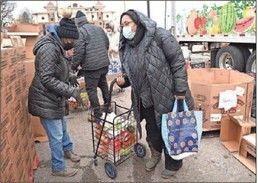
Detroit - Ramon Perez was near the front of the grocery line, but insurmountable choices stood between him and a Thanksgiving meal for his family.
It was 1:57 p.m. on Tuesday, a drizzly afternoon in the parking lot of the Patton Recreation Center on Woodmere Street in southwest Detroit. Perez, 73, hoped to weave through the line of 107 cars also waiting at the Forgotten Harvest food pantry site in 30 minutes or less.
Pre-registered or not, residents could drive through to pick up free food ahead of the holiday.
Perez could either turn back in his sedan to pick up his son from school by 3 p.m. or wait in line for the free food he and his family needed, he said tearfully.
“I passed by because they're passing out food, but Idon't think I'll be able to get it,” said Perez, a Detroit retiree also trying to care for his wife, who has cancer. “Life can happen anyway. That's the way things happen.”
Perez isn't the only Metro Detroit resident struggling to put food on the table this year.
As the holidays kick off and residents might feel more inclined to give back, area food banks and related sites helping those in need are seeing demand rise to new levels this year.
Some on the front lines in keeping men, women and children fed in lean times see their constant presence as a sign that economic uncertainty and struggles remain in communities across the region that are still coping with shifts from the COVID-19
pandemic.
“Not everyone came out of the pandemic ahead,” said Kristin Sokul, senior director of advancement for communications, marketing and media/PR at Gleaners Community Food Bank. “It sort of pushed those families over the edge.”
Serving Wayne, Oakland, Macomb, Livingston
________________________________________
and Monroe counties, the Detroit- based group works with more than 400 soup kitchens, schools and agencies to deliver food to those in need.
Residents usually seek more help around the holidays because of food-centered celebrations, but this is a surge unlike any other year, Sokul said.
Gleaners has seen a 30% increase in requests for support over the past year, Sokul said.
That demand mirrored the picture at Forgotten Harvest, which rescues surplus food from grocery stores, restaurants and other sites around Metro Detroit and delivers to emergency food providers.
Forgotten Harvest also saw that 30% jump in demand in 2023 alone, said Chris Ivey, a marketing and communications director at the nonprofit.
“It's a compound issue,” said Ivey, adding it's hard to pinpoint an exact cause for the increase amid inflation, colder winter months, the holidays and labor actions such as the recent UAW strike of the Detroit Three automakers.
“If you're struggling from food insecurity, it is the ongoing anxiety of: where are you going to get enough food to feed your family?” Ivey said.
Waiting lists for food growing
Some link the spikes to more recent developments.
As inflation soared and other federal and state pandemic aid waned in 2022, food insecurity skyrocketed in U.S. households, according to the U.S. Department of Agriculture.
An estimated 17 million American households reported problems finding food last year, according to a USDA report released in October. That was up from 13.5 million households in 2021.
A2022 report from Michigan's Food Security Council estimated more than 1 million state residents face food insecurity.
Extra assistance from the Supplemental Nutrition Assistance Program (formerly known as food stamps) ended in March. More than 1.3 million Michigan residents lost SNAP benefits that month, the Center on Budget and Policy Priorities reported.
Household needs impact multiple levels and programs in southeast Michigan, the state's most populated region.
Shortly before Thanksgiving, the Macomb County Office of Senior Services issued an urgent request for volunteers to work for its Meals on Wheels program “in response to a growing waitlist of individuals needing delivery throughout the County,” officials said in a statement.
The office oversees 84 routes for the Meals on Wheels program that serves some 1,700 seniors, according to the release.
“We currently have a waiting list for seniors who need meals, especially for those who live in the north end of the county,” said Sheila Cote, director of Macomb County's Office of Senior Services. “We are asking for our community to help support our seniors by delivering meals.”
'Everything is expensive'
Why are more Metro Detroiters relying on such efforts to fill their cupboards?
Inflation has exhausted families' savings, expenses and paychecks as people wrestle with basic household bills, Sokul said.
With limited incomes, many Metro Detroit residents are turning to food pantries to make ends meet, she said.
That's the case for Perez.
“Everything is expensive,” said Perez, adding his wife's sickness this year strained family expenses that could normally get them by. “More than groceries. My wife can do nothing,
so I have to have somebody help us.”
It's a growing need within the community that food pantry volunteer worker Tristan Shannon said she also is feeling.
A single mother of three, Shannon had to move back in with her own mother as food prices continued to climb. Volunteering at the Patton Center's food pantry drive keeps her grounded as she sees other people in the community also asking for help, the 34-year-old said.
For Mapilde Lopez, 25, groceries are just the beginning of rising expenses that have driven her to seek aid for the first time this year, she said.
The unemployed mother of two and her sister wait in line in their cars as volunteers hand out egg cartons, soda bottles and seasoned chickens.
“I need this now,” Lopez said. “All the prices have already risen for food and other things. I can't afford it.”
More people in need than ever are also turning up to Detroit's Capuchin Soup Kitchen, said Brother Igor de Bliquy, the communications director for the Capuchin Franciscan Province of St. Joseph.
It's not just meals that people are seeking out, but also groceries and clothing at the Capuchin food and clothing pantries, he added.
The same can be said in Novi, where people at the St. James Food Pantry are grappling with rent and medication costs alongside unaffordable food, said Beth Bush, a Christian service assistant at St. James Catholic Church.
“Their food stamps are being cut,” Bush said. “Their other expenses are increasing. They're having trouble paying their rent and the price of food is going up. We hate to have them cut out their medications to have food, so that's why we have this program that we can help them.”
Perez has just enough food at home for now, but he's trying different food pantry sites to brace for the day his family's groceries eventually run out, he said.
At around 2 p.m. Tuesday, as the rain slowed down to a sprinkle, Perez's car hadn't moved any further in line.
“That's life, I guess,” he said, choosing to pick up his son on time as he rolled up his window and drove away.
The line of 106 cars remained.
Kailan Hardy gets food at the Forgotten Harvest food bank distribution Wednesday at Jesus Tabernacle of Deliverance Ministries in Detroit. Clarence Tabb Jr. / The Detroit News

